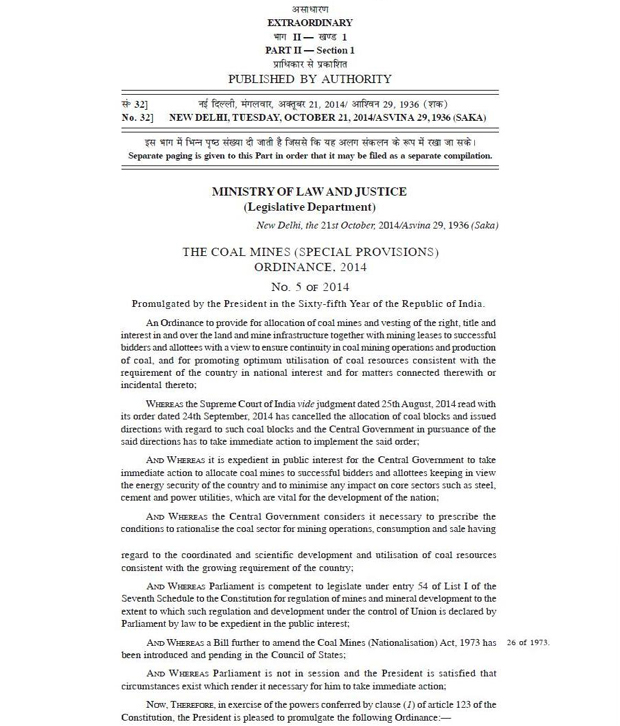Pratim Ranjan Bose
Indian coal sector was nationalized between
1971 and 1973. Private sector participation was encouraged in 1993, by broad-basing
scope of captive mining. The State monopoly over commercial mining is finally withdrawn
on Friday, March 20, 2015.
As per the Coal Mines (Special Provisions) Act,
that has been cleared by the Upper House (Council of States) of the Indian
Parliament, on Friday evening, coal sector is now open to competition.
Backroom negotiations
The Bill was promulgated as an Ordinance (a law
passed without prior discussion in the Parliament) on October 21, 2014.
But getting the bill ratified by the Parliament
was easier said than done. The Prime Minister, Narendra Modi’s, BJP, that has a
brute majority in the Lower House (Assembly of the People), is a minority in Upper
House.
In the final analysis, Modi cleared the test, as he managed to break the Opposition unity. The ruling Samajwadi Party (SP) in Uttar
Pradesh and the Trinamool Congress (TMC) in West Bengal , broke ranks with the Congress and
the Left, to support the bill.
Their sudden change of heart raised a few
eyebrows. Both SP and TMC sport a pro-Muslim image. They describe BJP as a Hindu
nationalist force and refuse to see eye-to-eye with Modi. Last but not the
least, both have many skeletons to sweep under the carpet.
The bottomline is: Indian coal sector is denationalized,
without much resistance.
Expect actions soon
As of now, the Modi government promises that
the provision to open coal sector is merely an enabling one. But, I doubt such
claims. I strongly believe that the government is keen to create a case for private
sector participation. And, it should come in doses.
The brunt may be borne by the State-owned Coal India
Ltd (CIL), which ceases to be a national miner from March 20, 2015.
The concern is not limited to loss of State monopoly.
With 40 per cent of the country’s identified coal reserves already earmarked
for the captive sector and, over million tonne of fuel imported every year; CIL
is willy-nilly thrown open to market risks.
This is evident in the company’s falling realization
from open market (e-auction) sales that is linked to global coal prices;
thinning profit margins and; knee-jerk reaction to customer grievances over
quality.
Ideally, competition should help India
Indeed there were some really good private miners
operating in India
Some concerns
But the concern lies elsewhere. The opening up of
the oil and gas exploration sector saw successive governments denying a level
playing field to ONGC and using it as a sacrificial goat to help prepare the
grounds for others. The aim was to let private sector grow at the cost of ONGC.
The Joint ventures in Ravva, Panna-Mukta-Tapti etc
were shoved down the throat of the company. Private sector made riches, ONGC paid
taxes on their behalf, until a courageous former chairman, Late Subir Raha, fought for equal terms.
That’s not all. In every NELP round, ONGC was
asked to fill government coffers by bidding for assets that didn’t find takers.
Good assets were taken back from the company under some pretext or the other. The
company’s bid to emerge as an integrated oil company was scuttled because
competitors were against it.
Revisit
the pages of the history and things may not look as bright and sunny as it is perceived.
Indeed, a look at the previous UPA government’s (failed) attempt to thrust some private miners as Mine Developer and Operators (MDO), on CIL, at outrageously unequal terms may serve as reality check.
CIL to enter JVs?
The history is murky. Yet, there is no way we
can hold Narendra Modi government responsible for a crime that they did not
commit. The job on hand is to guess the future moves of the government.
And, I don’t think there will be an immediate
attempt to distribute coal assets to private commercial miners. Because, such
miners would ask for freedom of pricing the commodity that India
I guess, armed with the legal sanction the Modi government
may push CIL to enter joint ventures with private miners, in the immediate run.
The nationalization made it impossible.
Theoretically, such an initiative should bring
dividends to the nation. CIL has deep pockets and coal assets. Foreign miners can
bring in better mining practices and technology, especially in underground
mining.
But the catch will lie in the terms of
reference of such JVs.
***
Tweet @pratimbose
(Disclaimer:
Graphics are collected from the web. Will be removed in case of any objection)





